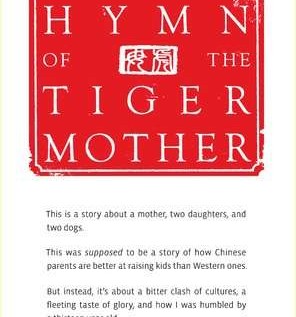Tiger Mothers: Raising Children The Chinese Way


Amy Chua may well be nuts. What kind of a mother hauls her then-7-year-old daughter’s dollhouse out to the car and tells the kid that the dollhouse is going to be donated to the Salvation Army piece by piece if the daughter doesn’t master a difficult piano composition by the next day? What kind of a mother informs her daughter that she’s “garbage”? And what kind of mother believes, as Chua tells readers she does, that: “an A- is a bad grade; … the only activities your children should be permitted to do are those in which they can eventually win a medal; and … that medal must be gold”?
What kind of a mother? Why, a mother who’s raising her kids the Chinese, rather than the Western, way. In her new memoir, Battle Hymn of the Tiger Mother, Chua recounts her adventures in Chinese parenting, and – nuts though she may be – she’s also mesmerizing. Chua’s voice is that of a jovial, erudite serial killer – think Hannibal Lecter – who’s explaining how he’s going to fillet his next victim, as though it’s the most self-evidently normal behavior.
That’s the other gripping aspect of Battle Hymn of the Tiger Mother: There’s method to Chua’s madness – enough method to stir up self-doubt in readers who subscribe to more nurturing parenting styles. Trust me, Battle Hymn is going to be a book club and parenting blog phenomenon; there will be fevered debate over Chua’s tough love strategies, which include ironclad bans on such Western indulgences as sleepovers, play dates, and any extracurricular activities except practicing musical instruments … which must be the violin or piano.
The back story to Chua’s memoir is this: She is the daughter of Chinese immigrants and is now a professor at Yale Law School and the author of two best-selling “big-think” books on free-market democracy and the fall of empires. When Chua married her husband, fellow Yale law professor and novelist Jed Rubenfeld, they agreed that their children would be raised Jewish and reared “the Chinese way,” in which punishingly hard work – enforced by parents – yields excellence; excellence, in turn, yields satisfaction in what Chua calls a “virtuous circle.”
The success of this strategy is hard to dispute. Older daughter Sophia is a piano prodigy who played Carnegie Hall when she was 14 or so. The second, more rebellious daughter, Lulu, is a gifted violinist. Chua rode the girls hard, making sure they practiced at least three hours a day even on vacations, when she would call ahead to arrange access to pianos for Sophia in hotel lobby bars and basement storage rooms. Chua also rarely refrained from criticizing her daughters, and in one of the many provocative passages that fill her book, she explains: Chinese parents can do things that would seem unimaginable – even legally actionable – to Westerners.
Chinese mothers can say to their daughters, “Hey fatty – lose some weight.” By contrast, Western parents have to tiptoe around the issue, talking in terms of “health” and never ever mentioning the f-word, and their kids still end up in therapy for eating disorders and negative self-image. … Western parents are concerned about their children’s psyches. Chinese parents aren’t. They assume strength, not fragility, and as a result they behave very differently.
As Chua admits, though, the Chinese model doesn’t dwell on happiness, nor does it deal well
with failure. (Some of the most hilarious parts of her memoir deal with her attempts to apply Chinese parenting methods to the family’s two dopey Samoyed puppies.)
I was on my living room couch, reading the end of Chua’s memoir, when my 12-year-old
daughter came downstairs and announced that she had “done enough reading” for one day and that since she had also practiced flute (for 15 minutes) she was going to kick back and watch TV – in this case, a made-for-TV Disney movie. Chua tartly sums up the stereotypically “Western” Disney plot this way:
“In Disney movies,” she says, the [studious kid] always has to have a breakdown and realize that life is not all about following rules and winning prizes, and then take off her clothes and run into the ocean or something like that. But that’s just Disney’s way of appealing to all the people who never win any prizes. Winning prizes gives you opportunities, and that’s freedom – not running into the ocean.”
I looked over at my daughter and had mixed feelings about her just chillin’ in front of the TV, rather than plugging away in that virtuous circle of enforced practice. I guess we won’t be sending out the invitations for Carnegie Hall anytime soon.


